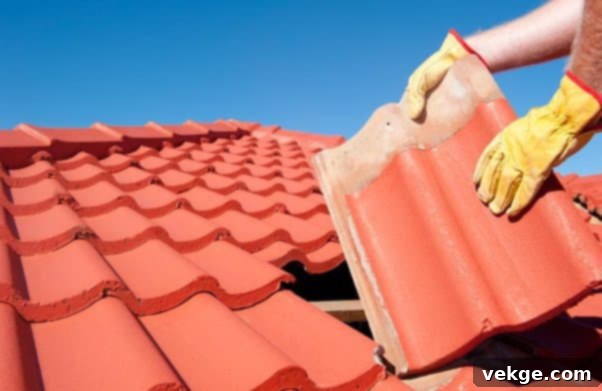Discover the Best Flat Roof Materials: Durability, Efficiency, and Longevity
Flat roofs have often been misunderstood, perceived as the less glamorous sibling to their pitched counterparts. However, modern flat roofing systems, equipped with the right materials, are true titans of resilience, designed to withstand the harshest weather conditions. From relentless downpours to scorching UV radiation, contemporary flat roof materials stand firm, proving that these roofs are not only practical but incredibly robust.
The evolution of flat roof materials has transformed them into powerhouses of durability and resilience, shrugging off severe weather as merely another day on the job. Whether your property faces sweltering summer heat or icy winter blasts, selecting the optimal materials ensures your roof remains a steadfast, reliable protector for decades. This advancement means peace of mind for property owners, knowing their investment is well-guarded.
Expert commercial roofing contractors have long harnessed the power of these weather-defying wonders, employing their specialized knowledge to keep commercial buildings secure and dry through the most challenging conditions. Their expertise in material selection and installation is crucial for maximizing the performance and lifespan of any flat roof system.
In this comprehensive guide, we’re going to pull back the curtain on these unsung heroes of the roofing world. You’ll discover why materials like EPDM, TPO, PVC, modified bitumen, and built-up roofing (BUR) are your ultimate allies when the weather forecast looks bleak. Each of these high-performance materials boasts unique superpowers, meticulously engineered to combat whatever Mother Nature throws their way, ensuring your flat roof is truly built to last.
EPDM – The Resilient Rubber Roof Solution
When you think of rubber, you might imagine tires or playground surfaces, but EPDM (Ethylene Propylene Diene Monomer) is a superstar in the realm of flat roof materials. This synthetic rubber composition offers exceptional performance and a remarkably long lifespan, making it a top contender for any flat roofing project.
Outstanding Durability and Longevity
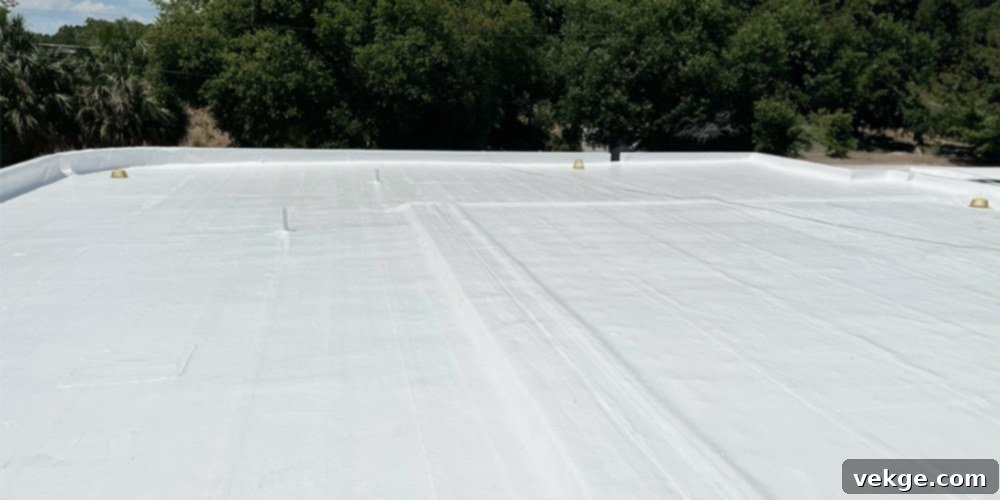
EPDM is the marathon runner of flat roofing, designed to go the distance with unparalleled endurance. With an impressive lifespan often exceeding 50 years, EPDM is a leader in longevity. Its incredible durability stems from a robust chemical structure that consistently withstands wear and tear year after year. Property owners can rest assured that their EPDM roof will resist cracking, shrinking, and blistering, providing steadfast protection for decades without significant degradation.
Superior Weather Resistance
When it comes to battling the elements, EPDM truly excels as a heavyweight champion among flat roof materials. This remarkable material effortlessly withstands harsh UV rays, ozone exposure, and extreme temperature fluctuations. Whether facing the scorching heat of summer or the bitter cold of winter, EPDM maintains its inherent flexibility and strength.
Unlike some roofing materials that may become brittle in freezing temperatures or soften under intense heat, EPDM remains consistently stable and effective. Its exceptional resistance to weather extremes translates into fewer concerns for property owners and greater peace of mind, knowing their roof can capably handle whatever Mother Nature sends its way. For ultimate weather protection, EPDM is an undeniable top choice for any flat roof system.
Effortless Maintenance and Repair
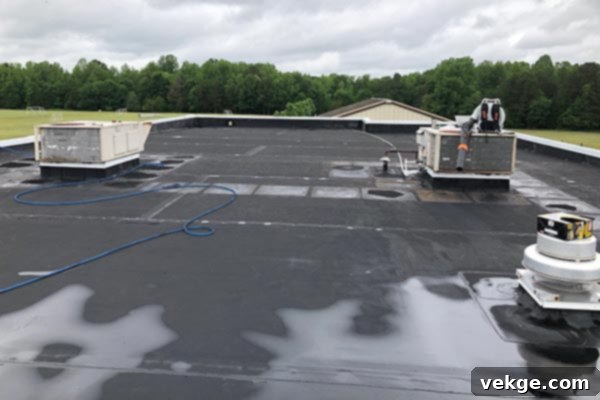
One of the most appealing advantages of EPDM roofing is its straightforward installation and repair process. Think of EPDM as the low-maintenance friend of the roofing world, always reliable and easy to work with. EPDM membranes are available in large sheets, allowing for vast areas to be covered with minimal seams. This significantly reduces the potential for leaks, a critical factor for any flat roof.
Should a repair ever be necessary, the process is typically simple and does not necessitate a complete roof overhaul. Small damaged areas can be efficiently patched without replacing the entire membrane, leading to considerable savings in both time and money over the roof’s lifespan. Furthermore, the installation process is relatively uncomplicated, making it a preferred choice among experienced commercial roofing contractors who value its hassle-free application and consistent performance.
TPO – The Energy-Efficient Flat Roof Champion
TPO (Thermoplastic Olefin) has emerged as a true superhero among flat roof material types, engineered to tackle demanding weather conditions and provide exceptional energy efficiency. Many ask, “What makes TPO such a remarkable choice for modern flat roofs?” Let’s delve into its key advantages that make it a leader in flat roofing solutions.
Unmatched Energy Efficiency
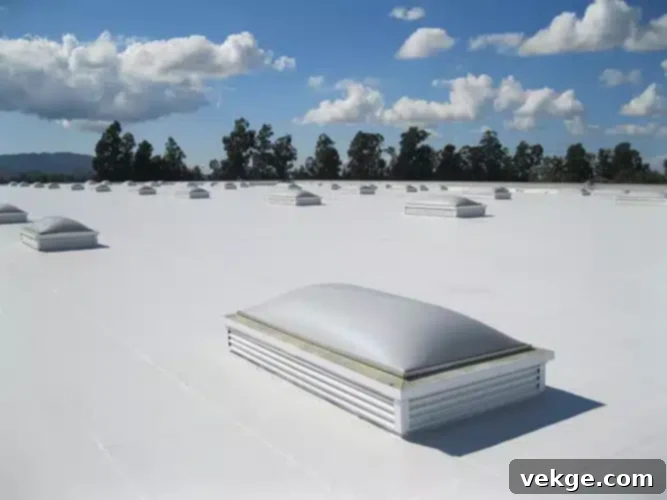
TPO is far more than just another roofing material; it’s a strategic investment for significant energy savings. Its highly reflective surface efficiently bounces sunlight away from your building, dramatically reducing heat buildup inside. This superior reflectivity means your air conditioning system won’t have to work as hard during those sweltering summer months, directly translating into lower energy bills. Your interior spaces remain cooler and more comfortable, while your operational costs are minimized, making TPO an excellent choice for sustainability and economy.
Exceptional Seam Strength
One of TPO’s most distinguishing features is its innovative heat-welded seams. Unlike other materials that rely on adhesives or tapes, TPO seams are fused together using heat, creating an incredibly strong, monolithic bond. These robust seams provide unparalleled strength and create a virtually impenetrable barrier against leaks and water damage. While traditional roofing materials might struggle to maintain a watertight seal over time, TPO’s strong seams stand firm. This inherent durability is particularly vital in regions prone to heavy rainfall or significant snowfall, where the last thing any property owner needs is a compromised roof.
Remarkable Flexibility
TPO maintains its excellent flexibility across a vast range of temperatures, significantly reducing its susceptibility to cracking in cold weather. This inherent flexibility ensures that your flat roof can adapt seamlessly to thermal expansion and contraction without compromising its structural integrity. In contrast to some materials that become brittle and prone to damage in freezing conditions, TPO consistently retains its resilience. This gives property owners invaluable peace of mind through every season, knowing their roof will perform reliably regardless of temperature fluctuations.
For these reasons, professional commercial roofing contractors frequently recommend TPO for both residential and commercial properties. Its robust performance combines superior energy efficiency, exceptional durability, and outstanding flexibility, firmly positioning TPO as a premier contender among all flat roof material types.
PVC – The Durable and Chemically Resistant Flat Roof Option
When evaluating the best flat roofing materials, PVC (Polyvinyl Chloride) stands out as an exceptionally strong performer. It’s often considered the superhero among various types of roofing materials for flat roofs, expertly combining remarkable longevity, superior chemical resistance, and excellent fire safety properties into one impressive and highly functional package.
Exceptional Longevity
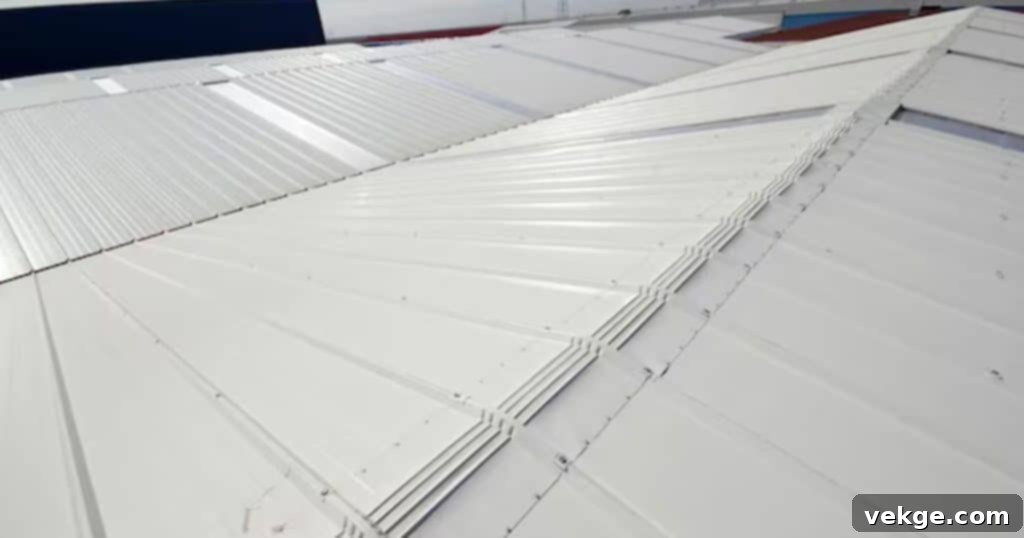
PVC roofs are engineered for enduring performance, with a lifespan that can easily exceed 20 years, often extending much further with proper maintenance. This means property owners are investing in a roofing solution truly built to last. The remarkable durability of PVC is attributed to its inherently robust composition and advanced manufacturing processes.
Unlike some alternative materials that may be prone to cracking or deterioration over time, PVC maintains its structural integrity consistently. Its superior resistance to a wide array of environmental stressors, including severe weather conditions and prolonged UV radiation, ensures it remains in peak condition throughout its extended service life. With a PVC roof, you can relax, confident that your roof is expertly equipped to handle whatever Mother Nature challenges it with.
Outstanding Chemical Resistance
PVC’s exceptional resistance to various chemicals is a primary reason it stands as a top choice, particularly for commercial and industrial properties. Whether your roof needs to fend off exposure to grease, airborne pollutants, industrial chemicals, or other corrosive substances, PVC remains unflinching and intact. This makes it an ideal flat roof material for buildings situated in urban or industrial areas where air quality might be less than pristine, or where chemical spills are a possibility.
Your PVC roof will consistently maintain its integrity and performance, irrespective of the chemical cocktail it may encounter, ensuring long-term protection and reliability.
Inherent Fire Resistance
Safety is paramount, and PVC delivers an essential advantage with its inherent fire-resistant properties, adding a critical extra layer of protection to your property. This is far from a minor benefit; it’s a significant game-changer in roofing safety. In the unfortunate event of a fire, a PVC roof can effectively help to slow down the spread of flames, providing invaluable time for emergency response and minimizing potential damage. It’s akin to having a built-in, passive defense system that is continuously on guard, enhancing the overall safety profile of your building.
Modified Bitumen – The Flexible and Reinforced Flat Roof System
Modified bitumen roofing is the flat roof superhero that many property owners might not realize they need. This advanced roof material for flat roofs masterfully combines the traditional, robust strength of asphalt with the enhanced flexibility and resilience of polymer additives. The secret to its superior performance lies within its unique, engineered composition, making it a formidable defense against the elements.
Exceptional Strength and Flexibility
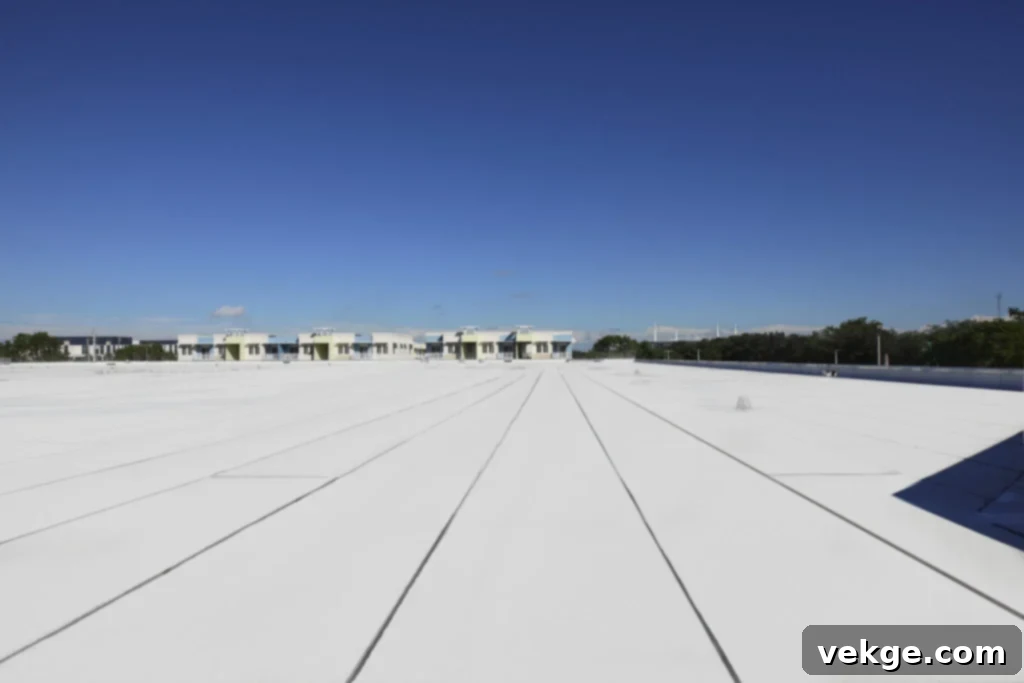
Modified bitumen is designed for enduring resilience. The asphalt component provides a sturdy and waterproof base, while the integrated polymers significantly enhance its elasticity. This powerful combination allows your roof to expertly handle the constant expansion and contraction caused by temperature fluctuations without succumbing to cracking or splitting. Essentially, modified bitumen delivers the best of both worlds: the robust toughness of asphalt paired with the adaptable resilience of advanced polymers, resulting in a highly durable and long-lasting flat roof system.
Superior Layered Protection
What truly sets modified bitumen apart as one of the most effective materials for flat roofs is its sophisticated multi-layered construction. Visualize it as a robust armor system for your roof. Multiple plies of bitumen, reinforced with high-strength fabrics such as fiberglass or polyester, create a thick, impenetrable shield against severe weather conditions. These meticulously engineered layers work synergistically to deliver superior waterproofing capabilities, which is absolutely crucial for flat roofs that must manage water drainage more effectively than sloped roofs. Each additional layer fortifies the roof, ensuring it can confidently withstand heavy rains, substantial snow loads, and even impacts from hail without any compromise to its integrity.
Excellent Temperature Tolerance
A standout attribute of modified bitumen is its impressive and consistent performance across an extensive spectrum of temperatures. Whether your property endures the scorching heat of summer or the biting cold of winter, this material remains unwavering and reliable. It retains its flexibility remarkably well in low temperatures, which significantly reduces the risk of cracks and brittle failure. Simultaneously, it maintains its integrity in high temperatures, effectively preventing softening or melting. This makes modified bitumen an exceptional choice for buildings located in regions with extreme seasonal variations, guaranteeing that your roof remains intact, effective, and protective throughout the entire year.
Why Opt for Modified Bitumen for Your Flat Roof?
Choosing modified bitumen as your flat roof material is a decision grounded in practicality, long-term economic benefits, and superior performance. You’re not merely selecting a roof that offers aesthetic appeal; you’re investing in a system meticulously engineered to perform exceptionally well under pressure. Its inherent strength and flexibility translate into fewer repair needs and a significantly longer lifespan, saving you substantial money and preventing headaches over the years.
The system’s layered protection guarantees superior resistance to leaks and comprehensive weather damage, providing invaluable peace of mind during even the harshest storms. Coupled with its excellent temperature tolerance, you can be entirely confident that your modified bitumen roof will consistently remain in peak condition, delivering reliable protection for your property, regardless of the external weather conditions.
Built-Up Roofing (BUR) – The Time-Tested Multi-Layered System
Built-Up Roofing (BUR) is often hailed as the grandfather of low-slope roofing systems, boasting a proven track record stretching back over a century. This traditional flat roof material has stood the test of time, known for its incredible strength, waterproofing capabilities, and impressive durability. When considering flat roof options, BUR remains a reliable and robust choice for many applications.
Traditional Strength and Proven Performance
BUR systems are constructed on-site using multiple layers, typically consisting of alternating plies of roofing felts saturated with asphalt or coal tar pitch. These layers are then topped with a layer of aggregate (gravel or crushed stone) or a cap sheet. This multi-layered approach creates a formidable, seamless membrane that offers exceptional protection. The inherent strength of this system provides a highly durable surface that can withstand heavy foot traffic, impacts, and general wear and tear, making it a robust option for commercial and industrial buildings.
Superior Waterproofing with Multiple Layers
One of the core advantages of a BUR system is its unparalleled waterproofing. The numerous alternating layers of bitumen and reinforcing felts create a dense, highly resistant barrier against water penetration. Any small breach in one layer is typically covered and protected by the layers above and below it, significantly reducing the risk of leaks. This redundancy in waterproofing is crucial for flat roofs, where water tends to pool rather than drain quickly, ensuring maximum protection against moisture intrusion and subsequent damage.
Enhanced Weather Protection and Fire Resistance
The aggregate top layer, usually gravel or crushed stone, serves multiple critical functions. It acts as a ballast to hold the membrane down, offers excellent UV protection to prevent degradation of the asphalt, and provides a significant level of fire resistance. This protective layer deflects sunlight, which helps to keep the roof surface cooler, contributing to internal temperature regulation. Additionally, the inherent mass and fire-resistant properties of the aggregate layer act as an effective barrier against external flame spread, further enhancing the safety profile of the building.
Versatility and Adaptability
BUR systems are highly versatile and can be applied over various substrates, making them suitable for a wide range of building types and designs. The application process, though often more labor-intensive than single-ply systems, allows for customization in terms of layer thickness and aggregate type. This adaptability ensures that a BUR system can be tailored to meet specific performance requirements and environmental conditions, providing a custom-engineered solution for long-term flat roof protection.
Choosing the Right Flat Roof Material: A Comprehensive Approach
Selecting the ideal flat roof material for your property involves careful consideration of several factors, including climate, budget, desired lifespan, and specific performance needs. Each material discussed—EPDM, TPO, PVC, modified bitumen, and Built-Up Roofing—offers distinct advantages, making them suitable for different applications.
For ultimate longevity and weather resistance, EPDM stands out. If energy efficiency and strong seams are your priority, TPO is an excellent choice. PVC offers outstanding chemical resistance and fire safety, making it ideal for specialized commercial environments. Modified bitumen provides a balanced blend of strength, flexibility, and layered protection, while BUR offers a time-tested, multi-layered defense with superior waterproofing.
Ultimately, the decision should be made in consultation with experienced roofing professionals. Commercial roofing contractors possess the expertise to assess your building’s unique requirements, local climate conditions, and budget constraints to recommend the most suitable and cost-effective flat roofing solution. Investing in the right material and professional installation ensures your flat roof provides durable, efficient, and long-lasting protection, safeguarding your property for many years to come.
